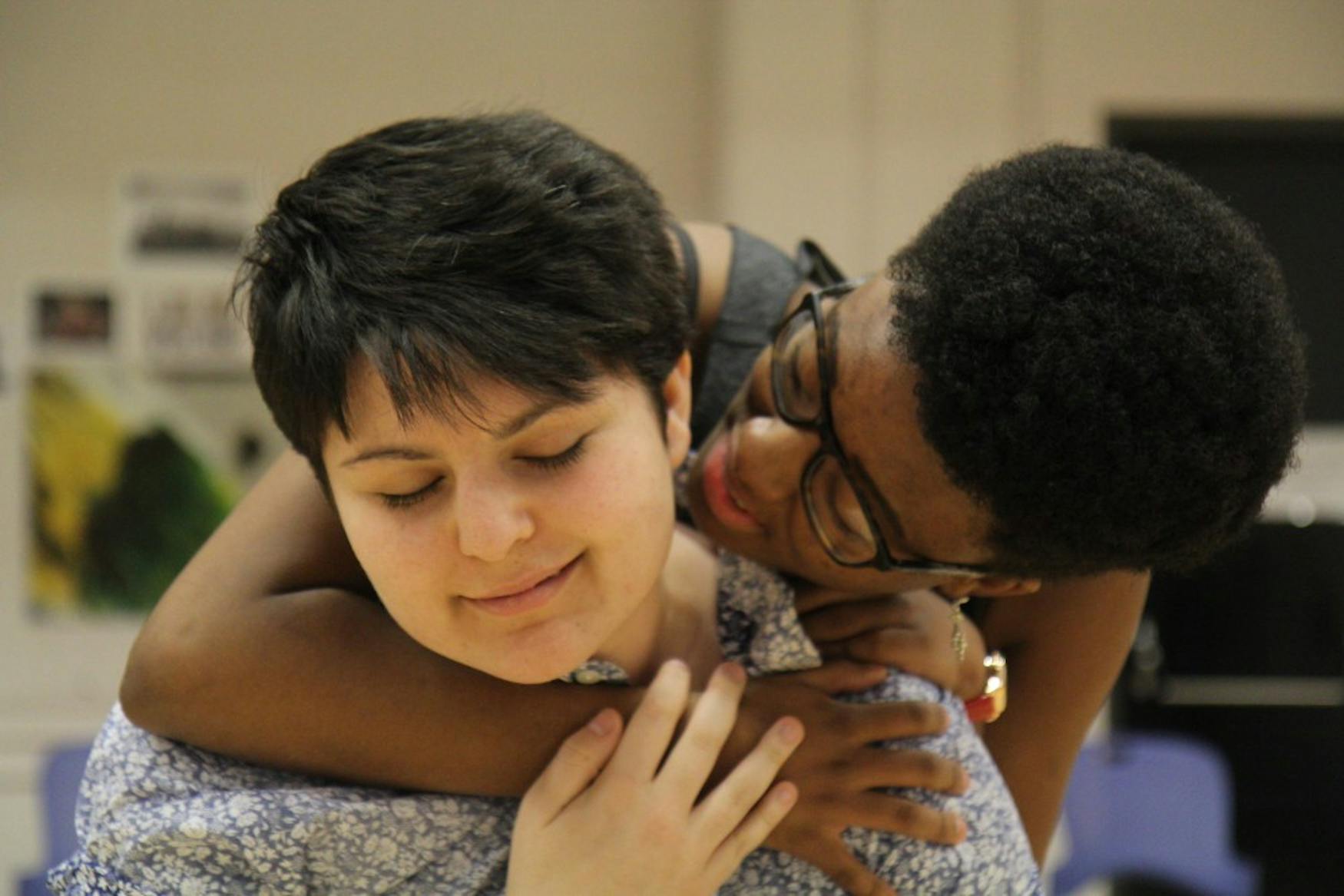‘Distance’ investigates love’s challenges
A battle of of self-identification between two individuals from opposing worlds intersected combined with racial tensions across the nation was exceptionally portrayed in Distance, directed and written by Sarah Waldron ’17 in the Merrick Theater of Spingold Theater Center. Uptight, abused and deeply insecure Micah’s (Gabby Lamm ’17, Sarah Duffett ’18, Lily Shrayfer ’18) statement toward the middle of the show, “We’re too complicated to be fair!” does not emphasize the complexity of this production enough.
Even though the long-distance relationship between Micah and her significant other, Charlie (Yaznil Baez ’16, LaShawn Simmons ’18, Nyah Macklin ’16), presented many complications, such as jealousy and instability, it was not enough for Waldron. Three students were cast for three of Micah’s different mental states. Like Micah, three more students were cast for each of Charlie’s flirtatious yet complex personas. Surprisingly enough, keeping up with each character’s personality was not as overwhelming as I imagined. One of the easiest identification tools used was costume. The Micahs wore blue and white patterns with a variety in the type of clothing chosen while the Charlies wore black and red. Each Charlie was very clear in the distinction from the others. They used tone of voice and inflection to assist the audience in following the multiple conversations between each persona. The Micahs, on the other hand, used physical gestures like posture and the way they walked across the stage to demonstrate their traits.
All the ladies who portrayed Micah’s character were stellar. In capturing the anxiety and jealousy of being alone without her significant other, the actresses truly annoyed me to the point that I wanted to remove Micah from the stage for a moment of peace. Their performances drew me into the action and were very convincing. Shrayfer was especially convincing throughout the play with her delivery of her lines and facial expressions. Her connection to the character was so strong I could feel her emotions from across the room.
Micah, a white/European female who grew up in a suburban and abusive household in the Midwest, finds a passionate voice in leading support groups that defend the Black Lives Matter movement in New York City. Although her past of family abuse and a cheating ex has impacted her paranoid tendencies, Micah finds love with a woman of African-American descent and an unstable lifestyle, Charlie. Micah’s personas battled fear of rejection when the three mental states explored ways to spark Charlie’s interest again. Most of the worries rose from Charlie’s absence during the Black Lives Matter movement. While Micah stays in New York year-round, Charlie is a flight attendant who constantly travels.
Charlie rarely spends long amounts of time in a single location, which is why it was difficult for her to finally settle down and fully commit to an intimate relationship with Micah. Baez played one of the Charlies with a fierceness that brought comedic relief during intense scenes. Her versatility, however, was revealed when she was caught arguing with the other Charlies and put her foot down uncovering the stubborn side to her character. Another actor who stood out Friday evening was Simmons. She was funny and loving yet conflicted; Simmons’ ability to navigate her character through complex emotions in the blink of an eye was provocative and admirable. Charlie’s personas often justified her chaotic lifestyle with the excuse of having a career as a flight attendant. Luckily, Macklin was the most grounded Charlie and consistently reminded the other Charlies of the love that Micah had. Due to fear, it was difficult to adjust to the idea of settling down, but Charlie accepted her fate with Micah and finally accepted her love for her.
The couple lacks the stability and trust of an ideal relationship, but they demonstrate an immense amount of passion and unconditional love. Because the Merrick Theater is such an intimate space, the actors used every inch of the room to convey the emotional distress from their complicated relationship. The constant walking around and through the audience was at times unsettling. Although uncomfortable, the uneasiness of the blocking helped the audience feel the anxiety of dealing with fear, worries and confusion. The use of space was unpredictable, which led to pleasant surprises when actors would appear from side doors or even from within the audience.
The production was an excellent student-run project. The talent the cast and production staff presented was refreshing and provocative. I hope to see more students push the boundaries of theater arts through political commentary.



Please note All comments are eligible for publication in The Justice.